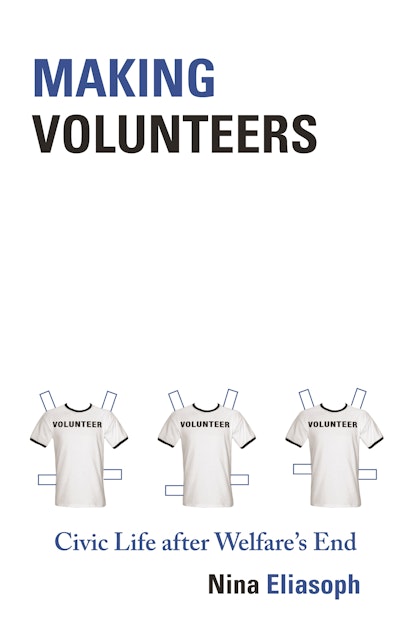Volunteering improves inner character, builds community, cures poverty, and prevents crime. We’ve all heard this kind of empowerment talk from nonprofit and government-sponsored civic programs. But what do these programs really accomplish? In Making Volunteers, Nina Eliasoph offers an in-depth, humorous, wrenching, and at times uplifting look inside youth and adult civic programs. She reveals an urgent need for policy reforms in order to improve these organizations and shows that while volunteers learn important lessons, they are not always the lessons that empowerment programs aim to teach.
With short-term funding and a dizzy mix of mandates from multiple sponsors, community programs develop a complex web of intimacy, governance, and civic life. Eliasoph describes the at-risk youth served by such programs, the college-bound volunteers who hope to feel selfless inspiration and plump up their resumés, and what happens when the two groups are expected to bond instantly through short-term projects. She looks at adult “plug-in” volunteers who, working in after-school programs and limited by time, hope to become like beloved aunties to youth. Eliasoph indicates that adult volunteers can provide grassroots support but they can also undermine the family-like warmth created by paid organizers. Exploring contradictions between the democratic rhetoric of empowerment programs and the bureaucratic hurdles that volunteers learn to navigate, the book demonstrates that empowerment projects work best with less precarious funding, more careful planning, and mandatory training, reflection, and long-term commitments from volunteers.
Based on participant research inside civic and community organizations, Making Volunteers illustrates what these programs can and cannot achieve, and how to make them more effective.
Awards and Recognition
- Winner of a 2014 Phi Kappa Phi Faculty Recognition Award
"Sociologist Eliasoph reports on her participant-as-observer study focusing on the use of volunteers in empowerment programs for disadvantaged youth. The work is a critical analysis of government and privately funded empowerment programs. . . . Eliasoph writes well, and the text is within the reach of most adult readers."—Choice
"The book is written to appeal to a general audience but should be of particular interest to many organizational scholars and practitioners. It is especially relevant to those studying or leading organizations that seek to blend multiple missions, to integrate participants across racial, ethnic, or class boundaries, or to empower their participants in some way. For these readers, the book provides many valuable interpretive nuggets, as well as exhibiting a keen eye for detecting empty talk and gesture."—Tim Bartley, Administrative Science Quarterly
"I find a lot to recommend in Making Volunteers. The writing is engaging, and Eliasoph makes several valuable contributions to the study of non-profits, organizations, volunteering, and civic culture. Beyond scholars in these and related areas, faculty whose courses include service learning projects, as well as funders, paid organizers, and potential volunteers for Empowerment Programs would be well served to read Making Volunteers and heed its lessons."—Jennifer L. Glanville, Political Science Quarterly
"Ethnographic research on volunteering is thin on the ground. This is surprising considering that the nature of charitable work, which is the lifeblood of so many communities, has proved so elusive to pin down in official statistics. Nina Eliasoph's new book, Making Volunteers: Civic Life after Welfare's End, therefore, is an important addition to the canon of literature which explains how people live the experience of voluntary action."—Jon Dean, Voluntas
"Eliasoph . . . concludes the book with an excellent (if difficult) series of recommendations for stakeholders involved in the world of empowerment projects as they currently exist. Project organizers, external funders, and government administrators should heed them. Projects with fewer contradiction-laden, empowerment-talk-driven, mega-events and more frank recognition of real needs and structural differences could avoid current harms and perhaps even reach some positive outcomes."—Matthew Baggetta, Public Administration
"This book is a pleasure to read—smart, insightful, tragic, ironic, and funny. Eliasoph brings to life the complicated relationships and dilemmas that surface in youth programs, and the twists and turns of the author's analysis are extremely compelling. This book is a must-read for those participating in NGOs, those trumpeting the virtues of volunteer work, and those social scientists interested in questions of government, community building, and civic culture."—Lynne Haney, New York University
"This clear and engaging book shows how community organizations really work. Nina Eliasoph tackles tensions that run through well-meaning organizations and lives, and she illustrates how people struggle with inequality, differences, having to be nice, and wanting to promote community but accomplishing much less than they desire or realize."—Robert Wuthnow, Princeton University


